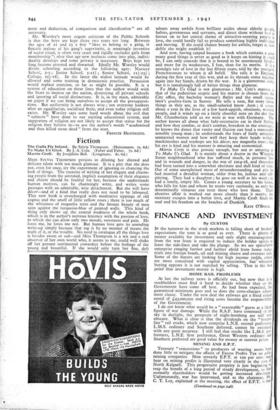Fiction
MISS SYLVIA THomPsoNt persists in diluting her shrewd and delicate talent with too much glamour. It is a pity that she does not, even for once, try the experiment of ignoring or chancing the look of things. The exercise of writing of her elegant and charm- ing people from the unstated, implicit assumption of their elegance and charm should be fruitful for her, because she understands human motives, can be charmingly witty, and writes some passages with an admirable, wise detachment. But she will have decor—and of a kind that really does not need to be laboured. This new book is overcharged with meditative sippings of old cognac and the smell of little yellow roses ; there is too much of the whiteness of magnolia trees and the bronze beauty of men seen against the turquoise-blue of painted walls. This kind of thing only shows up the central weakness of the whole book, which is in the author's nervous leniency with the passion of love, to which she can allow only two moods, sweetness and pain. He loves me, he loves me not. But human love gets its unending write-up simply because that tag is by no manner of means the truth of it, or the trouble. No need to catalogue all the things love is besides sweet or sad—and Miss Thompson is a wit and a real observer of her own world who, it seems to me, could well shake off her present sentimental cowardice before the feelings of the young and beautiful. If she would only turn her fine, deft talents away awhile from brilliant asides about elderly people, babies, governesses and servants, and direct them without fear or favour on to her central theme of attractive-seeming people I; love, she could hardly fail to produce something highly individna: and moving. If she could chance beauty for awhile, forget it, hoyy deftly she might establish it!
And now, having carped because a book which contains a great many good things is never as good as it keeps on hinting it could be, I can only concede that it is bound to be enormously liked— and more for its weaknesses, I fear, than for its merits. It is a nostalgic tale of love in the last fifteen years, told by the youngish Frenchwoman to whom it all befell. She tells it in England, during the first year of this war, and as its threads come together again into her hands, drawn by the war. It is a glamorous story, but it is tantalisingly full of better things than glamour.
To Make Us Glad is not glamorous ; Mr. Cole's manner is that of the pedestrian sceptic and his matter is chosen from the City office, the bachelor woman's flatlet and the small specu- lator's poultry-farm in Surrey. He tells a neat, flat story about things as they are, as the small-salaried know -hem ; it covers about a year in the lives of a few hard-uppish, obstinate, worried people, and it winds up on a fairly cheerful note on the day that Mr. Chamberlain told us we were at war with Germany. The author knows all about what lady-secretaries eat in their flatlets, and how they combat, or don't combat, boredom in the evenings ; he knows the dance that vanity and illusion can lead a reasonably sensible young man ; he understands the fears of fairly attractive unmarried women and how well they keep their heads withal ; mackintoshes and teashops are his decor, not magnolia trees ; but his eye is kind and his manner is amusing and economical.
Martin Croft is also prosaic enough, but not ac amusing as To Make Us Glad. It is mainly about a doctor in the Wimpole Street neighbourhood who has suffered much, in personal loss and in wounds and danger, in the war of 1914-18, and thereafter had been turned into a somewhat obstinate and dull kind of saint. Out of some unexplained mess of misunderstanding and pity he had married a dreadful woman, older than he, jealous and self- pitying. They had a daughter ; he goes on well at his work ; he had a lonely, empty life. Comes a young secretary to his house, who falls for him and whom he treats very curiously, as only the determinedly virtuous can treat those who love them. Their abortive affair is worked out more closely than it merits, the secretary escapes into a better love, and Martin Croft finds his soul and his freedom on the beaches of Dunkirk.
KATE O'BRIEN.


























 Previous page
Previous page